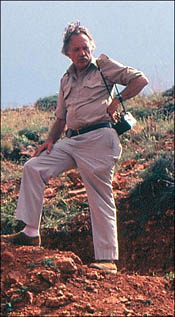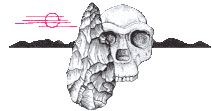In Memoriam
F. Clark Howell: 1925-2007
World-famous paleoanthropologist F. Clark Howell passed away March 10th, 2007, at the age of 81. Clark was our professor, research colleague, mentor, friend, and an important and immensely valued Advisory Board member of the Stone Age Institute. All of us at the Institute felt an enormous sense of personal and professional loss.
Clark was a truly remarkable person. His knowledge of human evolution was encyclopedic; he was proficient at human palaeontology, vertebrate palaeontology (including the evolution of the carnivores), and palaeolithic archaeology. His direction of the Omo Valley research project in Ethiopia set the standard for multidisciplinary palaeoanthropological research projects, combining specialists in palaeontology, geology, geochronology, and archaeology. He also carried out important field work at the Acheulean sites of Isimila in Tanzania and Torralba and Ambrona in Spain, as well as the Lower Palaeolithic site of Yarimburgaz in Turkey.
Clark was author of over 200 scientific publications and reviews, including “The Place of Neanderthal Man in Human Evolution” (1951), “Observations on the Earlier Phases of the European Lower Palaeolithic” (1966), the chapter “Hominidae” in Evolution of African Mammals (1978), “Overview of the Pliocene and earlier Pleistocene of the lower Omo Basin, Southern Ethiopia” (1978), “Evolutionary Implications of Altered Perspectives on Hominine Demes and Populations in the Later Pleistocene of Western Eurasia” (1998), and “Paleo-demes, species clades, and extinctions in the in the Pleistocene hominin record” (1999). He also wrote the popular Time-Life book Early Man (1965) which was, at the time of its publication, a major influence on at least two teenagers: palaeoanthropologist Tim White (now at UC Berkeley), and Nicholas Toth.
Clark was also probably the most important diplomat in the field, always encouraging collaboration between individuals and countries. His service for the University of California, the L.S.B. Leakey Foundation, and the National Academy of Sciences was very important, and the field of human evolutionary studies would not be where it is today without Clark’s indefatigable energy. He was also a foreign member of the science academies of England, France, and South Africa.
Born in Kansas City in 1925, Clark served in the U.S. Navy during the Second World War, and attended the University of Chicago. He became fascinated with human evolution and especially the Neandertals, receiving his doctorate in Anthropology from the University of Chicago in 1953, studying under Sherwood Washburn. He first taught anatomy in the medical school at Washington University in Saint Louis, but after two years moved to the Anthropology Department at the University of Chicago, where he became chair, and then moved to the Anthropology Department at the University of California at Berkeley in 1970, following his mentor Sherwood Washburn. Clarke became an emeritus professor in 1997.
On the personal side, we remember Clark affectionately as a great raconteur, a music lover (especially liking Big Band jazz and swing, Opera, and also contemporary artists like Bob Dylan), and a history buff (he said he would have studied the American Civil War if he hadn’t studied human evolution). He had a great love of the cultures of other countries: the art, architecture, literature, music, and cuisine. He also had a great sense of humor, and we will always remember his gentle chuckle and the special twinkle in his eye when relaying or appreciating a joke or humorous story. He was a gentleman and a scholar, a wonderful human being, and an exemplary role model for current and future generations of paleoanthropologists.
Nicholas Toth and Kathy Schick, Co-Directors, Stone Age Institute

F. Clark Howell


